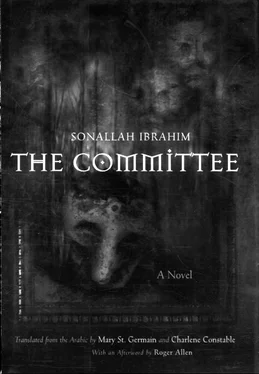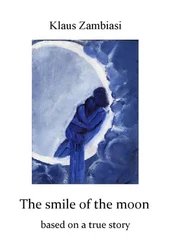"This creates a new problem, which is addiction to these drugs. However, diversification itself offers the solution for this problem, for during a course of treatment, the doctor falls back on a continual change of medication in which the multiplicity of drugs is helpful.
"To consider depression itself, it is usually equivalent to a crossroads whose branches sometimes lead to sexual impotence, religious fanaticism, apathy, slovenliness, or insanity.
"This you see, gentlemen, how the process of diversification leads in and of itself to explaining the many phenomena in our contemporary life and how it joins them as links in a strong chain."
One of the members spoke hesitantly, looking at the Blond from time to time, "You set forth your point of view t-ioroughly and clearly. But there is something I would like to understand. As far as I'm concerned, you haven'- dealt with the matter of tap water."
I answered at once in admiration, "You're right to raise this point, because it holds a special importance for all those engaged in scholarly research. It gives us a classic example of the mistakes in which researchers can get entangled.
"I knew the international sales volume of Coca-Cola and also that Egyptians are among the peoples who prefer tap water (in contrast to civilized people generally). This disparity induced me to link the return of this bottle to Egypt with the phenomena of the scarcity of tap water, its almost total disappearance during the day, and its dark, blackish color.
"However, I soon discovered that these phenomena mentioned above preceded the return of Coca-Cola by some years. Through research, I found that the tap had remained the main source of drinking water, from the '60s until the open-door policy went into effect and imported mineral water appeared. The change affecting tap water had begun at that moment, which was consistent with the results I found in similar circumstances, namely, the fate of the Egyptian cigarette.
"Reaching a conclusion and looking no further is among the perils normally facing researchers. However, continuing the research while guided by the same methodology, I was able to achieve a deeper understanding, which in turn revealed the links between a number of phenomena.
"To go on, for a long time Coca-Cola's desert irrigation projects were limited to a single category: desalinization of sea water. The October War provided a golden opportunity for it to diversify the tools of its trade by using the waters of the Nile to irrigate the Negev, facilitated by huge tunnels dug under the Suez Canal. Naturally, this sort of diversification leads to a scarcity of potable tap water, just as a lowering of the water level, through steadily increasing usage, causes dirt to permeate the water and change its color."
The Blond addressed me victoriously, "And you want us to believe you know all these things by your special effort with the newspapers?"
I answered, "Of course."
The officer-civilian or civilian-officer spoke for the first time. He was obviously wearing a wig. He addressed me firmly, "It would be best for you to tell the names of your accomplices and all the details of the conspiracy at once, before we force you. We are capable of undoing the knot in your tongue. Truly, due to the humanitarian principles that guide us, we are not inclined to resort to such methods, but the end justifies the means."
The old maid leaned toward me and said gently, "I don't believe we will be forced to go that far. He will talk when it's in his best interests."
My heart sank and I said, "I know the methods you refer to. Certainly they would force me to admit anything. But what I would admit in such a situation would not necessarily be the truth. You would always remain in doubt."
Silence fell over the hall and they began to exchange glances. I perceived-as the Committee would saythat this shot in the dark had hit home.
The Blond leaned toward the chairman and began a whispered exchange with him. Finally the latter spoke, "Perhaps it would be better if you withdrew for a little to consider the matter. You can go out now and we will summon you shortly to learn your decision."
I understood they wanted to get rid of me so they could deliberate freely. I left the hall and stood beside the elderly porter. I offered him a cigarette. He took it from me in silence and put it behind his ear. Meanwhile I lit up and inhaled greedily.
The hallway was empty. Light came from a large window in the opposite wall, which looked out on an empty courtyard. I smoked and peeked at the calm, resigned face of the porter sitting beside me. I wished for a moment that I were in his place, enjoying the same peace and tranquility. Then it occurred to me that his condition wasn't necessarily natural, that it could be the effect of some tranquilizer.
Whether that was the reason or whether he had picked up on how tight a spot I was in, he didn't reply when I tried to strike up a conversation by complaining of the heat.
I put out my cigarette, dropped the butt in the brass ashtray by the door, and leaned back against the wall. Unable to think, I looked ahead of me through the window, aware that I was staring out into nothingness.
After about half an hour the porter suddenly got up as though a secret message had reached him. He disappeared into the hall, reappeared at once, and signaled me to go in.
I entered nervously, hesitantly, hardly able to put one foot in front of the other. I stopped in the face of the stares surrounding me.
The old maid addressed me with her habitual graciousness, "What have you decided?"
"I don't have anything to add. I hope you appreciate the difficult, unnatural circumstances that hemmed me in," I said.
Suddenly ferocious, she said angrily, "Have it your own way then."
The chairman put some of the papers aside and said slowly, "Your intransigent attitude leaves us unable to find any rationalization for mercy or for granting your petition. Because of that-in our opinion-you deserve the harshest punishment on the books. This is our unanimous decision."
Some of them stood up and the others followed suit. They gathered their papers, pushed their chairs back, and headed for the inner door behind them. One after another they left the hall.
I continued watching their backs until the last of them had disappeared. I was alone-I, that picture of Stubby the ugly, and the funeral wreaths from all corners of the world.
I heard a noise at the main door to the hall. When I turned around I saw the porter looking at me questioningly. I walked toward him lethargically.
I stood outside until the porter had finished straightening up the hall and closing the windows. The moment he appeared in the doorway, I hurried over to offer him a cigarette and light it.
"Could you tell me the Committee's harshest punishment?" I asked him.
He shook his head and said firmly, "The Committee isn't a court."
"I know. What I'm looking for is the harshest punishment from their point of view."
"That depends on a lot of things."
"Naturally."
"Each situation is unique."
"Of course."
"In your case, which I have followed with great inter est, there is no punishment more severe or rigorous than consumption."
Astonished, I asked, "Consumption? Who consumes and wzat does he consume?"
He looked at me a while, then getting up, said deliberately, "You consume yourself."
He and his chair disappeared into the hall. He closed the dcor behind him, leaving me alone in the dimly lit corridor. I waited for him to return in order to ask for more information, but he was gone a long time, so I decided to leave. I passed through empty anterooms, my footsteps echoing behind me, until I had left the building.
I took off aimlessly through the streets, my gaze wandering among passersby, storefronts, and entrances to houses. Even so, I was able to notice how most of the passersby had caught the urge to seek wealth and happiness. Crates of Coca-Cola were everywhere. Everyone stood behind them, grocers, doorkeepers, carpenters, and even pharmacists.
Читать дальше











